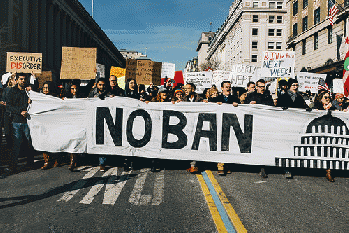The Trump administration on Thursday (June 1) asked the U.S. Supreme Court to revive his controversial Muslim travel ban executive order which was blocked by lower courts that found it discriminatory.
The Justice Department asked the apex court to temporarily lift injunctions that bar officials from carrying out Trump's March 6, 2017 directive to suspend visa issuance to citizens of six Muslim countries and halt the flow of refugees to the U.S. from across the globe.
If the government's emergency requests are granted, the ban would go into effect immediately.
President Trump's administration was seeking to overturn rulings by lower courts in Hawaii and Maryland that blocked a temporary ban on travel to the United States from six Muslim countries (Iran, Libya, Somalia, Sudan, Syria and Yemen).
The administration says the Constitution gives the president "broad authority to prevent aliens abroad from entering this country when he deems it in the nation's interest."
The move comes after the Richmond, Virginia-based 4th U.S. Circuit Court of Appeals on May 25 upheld a Maryland judge's ruling blocking the order. The court, in a majority opinion, with the chief judge writing that the travel ban "drips with religious intolerance, animus, and discrimination."
"We have asked the Supreme Court to hear this important case and are confident that President Trump's executive order is well within his lawful authority to keep the nation safe and protect our communities from terrorism," Justice Department spokeswoman Sarah Isgur Flores said in a statement. "The President is not required to admit people from countries that sponsor or shelter terrorism, until he determines that they can be properly vetted and do not pose a security risk to the United States."
The Justice Department filings argue that the lower courts were wrong to take into account Trump's statements from before he took office.
"This Court has never invalidated religion-neutral government action based on speculation about officials' subjective motivations drawn from campaign-trail statements by a political candidate," acting Solicitor General Jeffrey Wall and other government attorneys wrote. They added that the visa suspension in Trump's order "is not a so-called 'Muslim ban,' and campaign comments cannot change that basic fact."
A U.S. District Court judge in Seattle blocked the executive order on February 9, 2017. The Justice Department appealed to the 9th Circuit, which upheld the lower court's injunction.
The Court of Appeals said that the president's claim of ultimate authority over foreign policy was inadequate. "Although courts owe considerable deference to the President's policy determinations with respect to immigration and national security, it is beyond question that the federal judiciary retains the authority to adjudicate constitutional challenges to executive action," they said.
After first pledging to take the case to the U.S. Supreme Court, the president issued a revised executive order on March 6 in an effort to address objections raised by the Seattle judge.
Federal judges in Hawaii and Maryland have blocked President Donald Trump's Muslim Ban 2.0. In their ruling both judges cited Trump's statements about Muslims during the presidential campaign.
A federal judge in Hawaii ordered a temporary restraining order nationwide, hours before it was set to go into effect on March 16.
Another federal judge in Maryland specifically blocked the 90-day ban on immigration for citizens of six Muslim countries.
(Note: You can view every article as one long page if you sign up as an Advocate Member, or higher).






